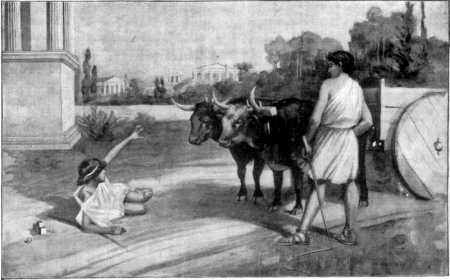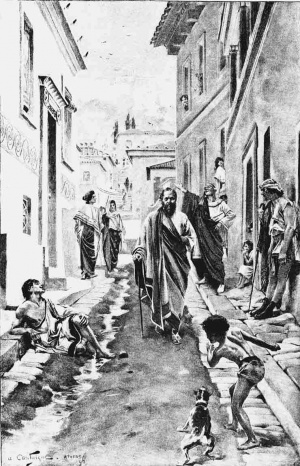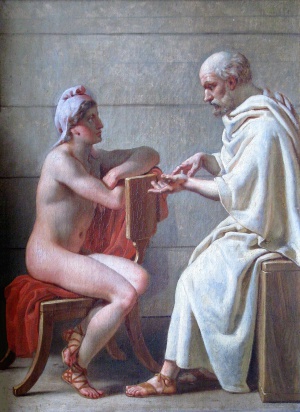Alcibiades: Difference between revisions
No edit summary |
|||
| Line 9: | Line 9: | ||
[[File:(USA) 1896 Alcibiades dared the driver to come on (The story of the Greeks p160) 801x499.jpg|thumb|upright= | [[File:(USA) 1896 Alcibiades dared the driver to come on (The story of the Greeks p160) 801x499.jpg|thumb|upright=1.5| Alcibiades dared the driver to come on / unknown artist – Engraving <ref Name="The story of the Greeks">''[http://www.gutenberg.org/files/23495/23495-h/23495-h.htm#LXIII_SOCRATES_FAVORITE_PUPIL The story of the Greeks]'' / Hélène Adeline Guerber, p. 160. – 169. </ref>]] | ||
The historic Alcibiades was (at least): | The historic Alcibiades was (at least): | ||
:— an orphan, always looking for love; | :— an orphan, always looking for love; | ||
Revision as of 11:14, 2 April 2015
Alcibiades, son of Cleinias, from the deme of Scambonidae (/ˌælsɨˈbaɪ.ədiːz/; Greek: Ἀλκιβιάδης Κλεινίου Σκαμβωνίδης, transliterated Alkibiádēs Kleiníou Skambōnidēs; c. 450 – 404 BC) historically was a Greek statesman and general. However, he has been best known posthumously as a disciple and especially the beloved boy (eromenos) of Socrates. This is clearly seen in Plutarch's life of Alcibiades [1], and in Plato's better-known Symposium. He has been, in post-Renaissance times, a coded symbol of pederasty. [2]
Alcibiades was orphaned at a young age leaving him with a large inheritance and he was brought up by Pericles and Ariphron, the sons of Xanthippus, who were his distant cousins. Plutarch says of Antiphon that he "admits that he hated Alcibiades, and abused him accordingly".[3]
Even as a young boy, he was very strong-willed. And perhaps as he had no father and mother to restrain his noble boyish inclinations, he was sometimes led by his own tenacity and courage into great danger. We are told that once, when he saw a wagon coming down the street where he and his playmates were playing knucklebones (jacks), he called to the man to stop. The man, who cared nothing for their game, drove on, and the other children quickly sprang aside so as not to be run over. Alcibiades, however, flung himself down across the road, in front of his playthings, and dared the driver to come on. The man was so amused by the little fellow’s pluck, that he actually turned around and drove through another street.[4] [5] [6]

The historic Alcibiades was (at least):
- — an orphan, always looking for love;
- — a really beautiful, clever and charming boy;
- — a “headstrong” child—able to lie down in front of a moving wagon to force the driver to stop it;
- — a young adolescent who left his house to go and openly live with his lover (erastes);
- — Socrates's pupil and young friend;
- — later, an important character of Plato's Symposium and other dialogs;
A boy and his dog

One of the attributes of Alcibiades is that he is often shown in paintings with his dog and it is frequently a good indicator that it is indeed Alcibiades who is being depicted.
Plutarch explained why Alcibiades was famous for his dog. And why from this time, the animal has been associated with him:
| “ | Possessing a dog of wonderful size and beauty, which had cost him seventy minas, he had its tail cut off, and a beautiful tail it was, too. His comrades chid him for this, and declared that everybody was furious about the dog and abusive of its owner. But Alcibiades burst out laughing and said: "That's just what I want; I want Athens to talk about this, that it may say nothing worse about me." [7] | ” |
Flatterers and lovers
Plutarch reports that as boy, Alcibiades ran away from home to Democrates, one of his lovers, perhaps to escape his abusive cousins. It is clear that Alcibiades had many admirers and lovers of all social levels in Athenian society.
| “ | It was not long before many men of high birth clustered about him and paid him their attentions. Most of them were plainly smitten with his brilliant youthful beauty and fondly courted him. [8] | ” |
However he is best known for his association with Socrates, who in many ways acts as his protector and shield against the excessive praise and flattery of his suitors, as well as Alcibiades' own natural flamboyance. Later, Socrates is reported to have actually saved Alcibiades' life in a battle. [6]
| “ | But it was the love which Socrates had for him that bore strong testimony to the boy's native excellence and good parts. These Socrates saw radiantly manifest in his outward person, and, fearful of the influence upon him of wealth and rank and the throng of citizens, foreigners and allies who sought to preëmpt his affections by flattery and favour, he was fain to protect him, and not suffer such a fair flowering plant to cast its native fruit to perdition.....
But the love of Socrates, though it had many powerful rivals, somehow mastered Alcibiades. For he was of good natural parts, and the words of his teacher took hold of him and wrung his heart and brought tears to his eyes. But sometimes he would surrender himself to the flatterers who tempted him with many pleasures, and slip away from Socrates, and suffer himself to be actually hunted down by him like a runaway slave. And yet he feared and reverenced Socrates alone, and despised the rest of his lovers. [8] |
” |
Alcibiades the Schoolboy (book)
Alcibiades the Schoolboy (L'Alcibiades, fanciullo a scola) by Antonio Rocco writen in the 17th century is a fictional dialogue in which Socrates portrays the excellence of sexual love between master and (male) disciple. Wikipedia says: "It is a tour de force of pederastic fantasy and one of the frankest and most explicit texts on the subject to have been written before the twentieth century. It has been called "the first homosexual novel". [9]
Review
First published in 1651 and meant at one level as a lively carnival booklet, this is, both at heart and on the surface, a well-reasoned polemic in favour of pederasty. The eponymous Athenian boy is presumably intended to be the famous Athenian general well-known for the amorous attentions he excited in his boyhood, but the book is a philosophical dialogue rather than a story about real people: Alcibiades's schoolmaster Philotimes is dying to consummate his love for his pupil and has to overcome with reason the full array of early modern arguments against sodomy raised by the initially reluctant boy, until the latter is finally eager to accept him.

There was a profound contradiction over pederasty in early modern Italy. On one hand, the authorities followed the church in denouncing and fiercely persecuting all sodomy. On the other hand, recent research such as Rocke's statistical study of Florentine court records in his Forbidden Friendships has proven the reports of contemporary writers that most men were involved with boys, and reinforced their implication that attraction to both women and boys was taken for granted (whether or not acted on).
Rocco was the most important of a tiny number of writers who dared counter the various arguments of God, law and nature which were supposed to justify this persecution. Those of God and the law are shown to be irrational inventions and nature is shown to favour the love of men and boys and its consummation. Rocco, or rather Philotimes, then proceeds to show how both these things are superior to the alternatives.
Lest it be supposed to be a sombre treatise, the fun should be explained too. Mostly, I think it comes from the sheer joie de vivre underlying the dialogue. There is plenty of satire ranging from the unphilosophical over-excitement of the supposed philosopher to the outrageous excess of some of his arguments. Also, the most serious arguments are so peppered with luscious descriptions of the boy's physical charms and frank sexual description as to be highly erotic. In this it offers a valuable lesson to modern writers on sexual matters whose dour vocabulary tends to be at odds with the joy which should be at the heart of their subject.
Considering all the old arguments against homosexuality have largely been abandoned in modern Europe, it is ironic that the only beneficiaries have been men loving men, described by Philotimes as "mere beasts" for their goatish tastes. Rocco's own book remains nearly as forbidden as ever, this the only English translation published having become virtually unobtainable within a few years and the form of love it upholds newly persecuted with an intensity the mediaeval inquisition could only have dreamed of managing. Today a new Rocco is badly needed, for despite doing his best to answer all, Philotimes was unable to anticipate a day when the adolescent consent to sex he fought so hard and well to obtain would be held in contempt. Nor could he foresee the perversity of an age which would see the sexual abuse of boys, which he fiercely denounced himself, as a justification for terrorising men and boys genuinely in love.
An excellent "Afterword" shedding light on the book by D. H. Mader overstates an important point: he claims it is early evidence of the modern homosexual identity explained by Foucault as having emerged in the late 19th century. Dialogues devoted to explaining why loving boys is better than loving women go back to antiquity, and are surely far removed from claiming an identity based on an immutable orientation. Philotimes explains his preference for boys as based on reason and experience; his arguments would have had to be quite different if he thought he had no choice about it.
References
Media-BoyWiki
has media related to
Alcibiades
- ↑ Homosexuality in Greece and Rome
- ↑ Alcibiades (character) (Wikipedia)
- ↑ The Parallel Lives by Plutarch, The Life of Alcibiades p. 1 - 10
- ↑ Plato, Alcibiades I p121.
- ↑ The Parallel Lives by Plutarch, The Life of Alcibiades p. 7
- ↑ 6.0 6.1 6.2 The story of the Greeks / Hélène Adeline Guerber, p. 160. – 169.
- ↑ Plutarch, The Parallel Lives The Life of Alcibiades p. 23
- ↑ 8.0 8.1 The Parallel Lives by Plutarch, The Life of Alcibiades p. 11 - 13
- ↑ Alcibiades the Schoolboy (Wikipedia)
- ↑ This review is from: Alcibiades the Schoolboy (Paperback) (amazon.com)
- ↑ Edmund Marlowe's Alexander's Choice